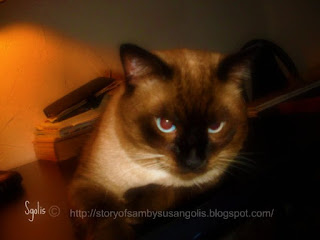The diagnosis
was due to my cat's elevated blood phosphorus reading. It was over the normal 6 mg/dl (USA) and indicated
kidney disease. There were no crystals
in his urine or any other indicator.
There are many
reasons why a cat would develop kidney disease.
Many older cats develop this condition due to kidney changes as they age,
they drink less water or their diet is primarily dry kibble.
Another reason
would be due to an infection, or a cat ate something toxic (lily flowers or antifreeze)
and it damaged their kidneys. Also, cats with FIV (feline immunodeficiency
virus) may develop kidney disease. My
FIV cat named Sam has chronic kidney disease.
Read the article here.
For my tabby cat, the reason was clear, he was not a big water drinker, and he preferred dry
kibble over wet canned food. When cats
eat only dry food which is half the
moisture of canned food, and not being a water drinker, those two factors will
cause kidney/bladder disease. I was
told that dry cat kibble was the leading cause of urinary and bladder
infections in cats.
Know that we
always topped our cats Purina ONE True
Instinct Natural Real Chicken Plus Vitamins & Minerals High Protein
Grain-Free Dry Cat Food with wet canned food but this cat
would only eat a little canned food, as he preferred dry. This food has a 12 percent moisture, it's
higher than many kibbles on the market, and many have less.
Due to his
kidney disease diagnosis, we must feed him the prescription canned food. I mix a little water in the food for extra
fluid which is good for his kidneys. He is not a fan of the canned food so I
will ask the veterinarian if there is a prescription kibble that he can eat
that I could mix with the canned food.

.webp)














































